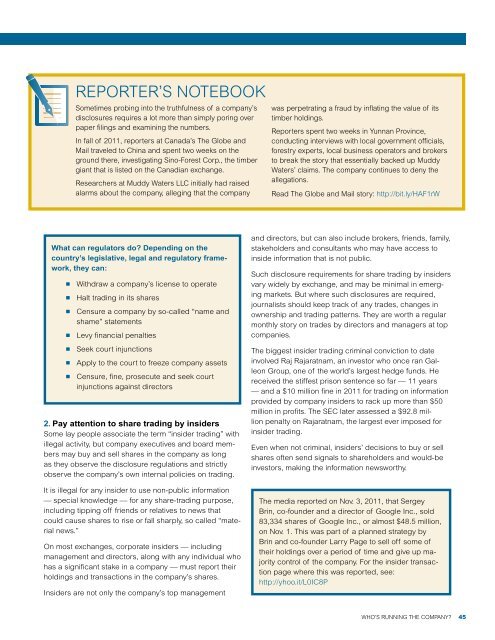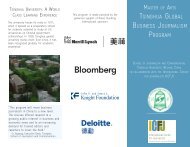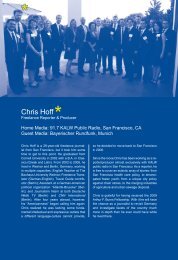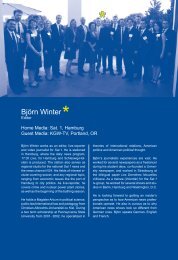Who's Running the Company? - International Center for Journalists
Who's Running the Company? - International Center for Journalists
Who's Running the Company? - International Center for Journalists
You also want an ePaper? Increase the reach of your titles
YUMPU automatically turns print PDFs into web optimized ePapers that Google loves.
REPORTER’S NOTEBOOK<br />
Sometimes probing into <strong>the</strong> truthfulness of a company’s<br />
disclosures requires a lot more than simply poring over<br />
paper filings and examining <strong>the</strong> numbers.<br />
In fall of 2011, reporters at Canada’s The Globe and<br />
Mail traveled to China and spent two weeks on <strong>the</strong><br />
ground <strong>the</strong>re, investigating Sino-Forest Corp., <strong>the</strong> timber<br />
giant that is listed on <strong>the</strong> Canadian exchange.<br />
Researchers at Muddy Waters LLC initially had raised<br />
alarms about <strong>the</strong> company, alleging that <strong>the</strong> company<br />
was perpetrating a fraud by inflating <strong>the</strong> value of its<br />
timber holdings.<br />
Reporters spent two weeks in Yunnan Province,<br />
conducting interviews with local government officials,<br />
<strong>for</strong>estry experts, local business operators and brokers<br />
to break <strong>the</strong> story that essentially backed up Muddy<br />
Waters’ claims. The company continues to deny <strong>the</strong><br />
allegations.<br />
Read The Globe and Mail story: http://bit.ly/HAF1rW<br />
What can regulators do? Depending on <strong>the</strong><br />
country’s legislative, legal and regulatory framework,<br />
<strong>the</strong>y can:<br />
n Withdraw a company’s license to operate<br />
n Halt trading in its shares<br />
n Censure a company by so-called “name and<br />
shame” statements<br />
n Levy financial penalties<br />
n Seek court injunctions<br />
n Apply to <strong>the</strong> court to freeze company assets<br />
n Censure, fine, prosecute and seek court<br />
injunctions against directors<br />
2. Pay attention to share trading by insiders<br />
Some lay people associate <strong>the</strong> term “insider trading” with<br />
illegal activity, but company executives and board members<br />
may buy and sell shares in <strong>the</strong> company as long<br />
as <strong>the</strong>y observe <strong>the</strong> disclosure regulations and strictly<br />
observe <strong>the</strong> company’s own internal policies on trading.<br />
It is illegal <strong>for</strong> any insider to use non-public in<strong>for</strong>mation<br />
— special knowledge — <strong>for</strong> any share-trading purpose,<br />
including tipping off friends or relatives to news that<br />
could cause shares to rise or fall sharply, so called “material<br />
news.”<br />
On most exchanges, corporate insiders — including<br />
management and directors, along with any individual who<br />
has a significant stake in a company — must report <strong>the</strong>ir<br />
holdings and transactions in <strong>the</strong> company’s shares.<br />
Insiders are not only <strong>the</strong> company’s top management<br />
and directors, but can also include brokers, friends, family,<br />
stakeholders and consultants who may have access to<br />
inside in<strong>for</strong>mation that is not public.<br />
Such disclosure requirements <strong>for</strong> share trading by insiders<br />
vary widely by exchange, and may be minimal in emerging<br />
markets. But where such disclosures are required,<br />
journalists should keep track of any trades, changes in<br />
ownership and trading patterns. They are worth a regular<br />
monthly story on trades by directors and managers at top<br />
companies.<br />
The biggest insider trading criminal conviction to date<br />
involved Raj Rajaratnam, an investor who once ran Galleon<br />
Group, one of <strong>the</strong> world’s largest hedge funds. He<br />
received <strong>the</strong> stiffest prison sentence so far — 11 years<br />
— and a $10 million fine in 2011 <strong>for</strong> trading on in<strong>for</strong>mation<br />
provided by company insiders to rack up more than $50<br />
million in profits. The SEC later assessed a $92.8 million<br />
penalty on Rajaratnam, <strong>the</strong> largest ever imposed <strong>for</strong><br />
insider trading.<br />
Even when not criminal, insiders’ decisions to buy or sell<br />
shares often send signals to shareholders and would-be<br />
investors, making <strong>the</strong> in<strong>for</strong>mation newsworthy.<br />
The media reported on Nov. 3, 2011, that Sergey<br />
Brin, co-founder and a director of Google Inc., sold<br />
83,334 shares of Google Inc., or almost $48.5 million,<br />
on Nov. 1. This was part of a planned strategy by<br />
Brin and co-founder Larry Page to sell off some of<br />
<strong>the</strong>ir holdings over a period of time and give up majority<br />
control of <strong>the</strong> company. For <strong>the</strong> insider transaction<br />
page where this was reported, see:<br />
http://yhoo.it/L0IC8P<br />
WHO’S RUNNING THE COMPANY?<br />
45
















